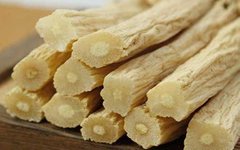Dang Shen (Codonopsis pilosula)
Dang Shen, also known as Huang Shen, Shi Tou Shen, and Zhong Ling Cao, is known for its ability to tonify the spleen and nourish the stomach, moisten the lungs and generate fluids, and invigorate the middle qi. It is quite similar to ginseng but is particularly valued for its ability to strengthen the spleen without causing dryness, nourish the stomach yin without being damp, moisten the lungs without being cold, and nourish the blood without being overly rich, thus uplifting the clear yang and invigorating the middle qi without the adverse effects of excessive dryness.
Dang Shen is produced in the southeastern part of Tibet, western Sichuan, northwestern Yunnan, eastern Gansu, southern Shaanxi, Ningxia, eastern Qinghai, Henan, Shanxi, Hebei, Inner Mongolia, and northeastern regions of China. Those from the northeast are commonly referred to as “Dong Dang” (Jilin Dang), those from the northwestern Shaanxi-Gansu area are called “Xi Dang”, those from Sichuan are known as “Chuan Dang”, those from Yunnan are called “Yunnan Dang”, those from Guizhou are referred to as “Guizhou Dang”, and those from the Daqingshan area in Inner Mongolia are called “Da Shan Dang Shen”.
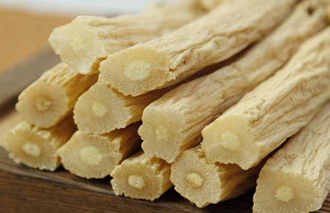
1. The Story of Dang Shen
After Qin Shi Huang unified China, he divided the country into thirty-six commanderies, and the area around the current city of Shanxi and Ping Shun County was known as the Shangdang Commandery. It is said that during the reign of Emperor Wen of the Sui Dynasty, a family in Shangdang Commandery heard calls from behind their house every night, but they could never see anyone. Later, they discovered a plant with unusual branches and leaves over a mile away from their home. Upon digging down to a depth of five feet, they found a root resembling a human form with limbs. After this root was unearthed, the family never heard the calls again. This story spread, and people believed that this plant was a “divine herb” blessed by the “spirit of the earth”. While this ancient legend may not be credible, it reflects the fact that Shangdang Commandery is rich in medicinal materials similar to ginseng, particularly Dang Shen. Even today, this region remains a concentrated area for Dang Shen production.
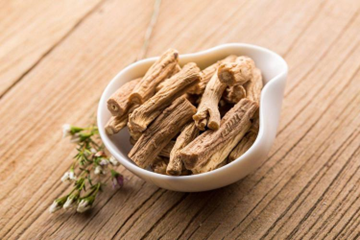
2. Growth Climate and Geographic Location
Dang Shen prefers a mild and cool climate, is cold-resistant, and its roots can survive winter in the soil. Seedlings thrive in moist, shaded environments and are sensitive to strong light. Lack of water after sowing can hinder germination, and insufficient water after germination can lead to mass death. High temperatures can cause root rot. Mature plants prefer abundant sunlight. It is best cultivated in deep, well-drained, loose sandy loam rich in humus.
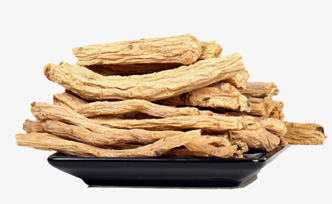
3. Properties and Meridians
[Main Properties] Sweet in flavor; neutral in nature. Enters the spleen and lung meridians.
[Basic Effects] Strengthens the spleen, nourishes the lungs, benefits qi, and generates fluids. Indicated for symptoms of spleen and stomach deficiency, poor appetite, loose stools, fatigue in the limbs, lung deficiency with cough and shortness of breath, spontaneous sweating, and deficiency of both qi and blood.
[Herbal Summary] According to the “Compendium of Materia Medica Supplement”, it is recorded that it “treats lung deficiency and benefits lung qi”. The “Shennong’s Herbal Classic” states, “Clears the lungs. Shangdang ginseng, although it does not have the strong warming and tonifying effects, possesses the ability to gently clear the lungs, and is not as cold and draining as Sha Shen”.
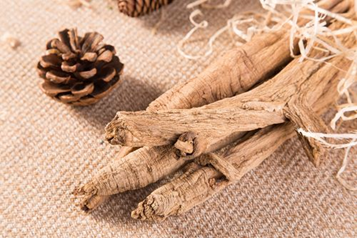
4. Dang Shen in Dietary Therapy
Shen Ling Porridge
[Ingredients] 10g of Dang Shen, 10g of Fu Ling (Poria), 10g of fresh ginger, 100g of japonica rice, salt or sugar to taste. First, wash the Dang Shen and Fu Ling, then soak them in 1000ml of water in a pot for 1-2 hours. Add the ginger and cook; once boiling, simmer on low heat for half an hour. Wash the japonica rice and add it to the pot, cooking for 1 hour, or use a pressure cooker for 30 minutes. Before eating, season with a little salt or sugar according to personal taste.
[Effects] Tonifies the spleen and benefits the stomach, warms the middle and stops vomiting. Suitable for those with spleen and stomach deficiency, poor appetite, vomiting, weight loss, and fatigue.
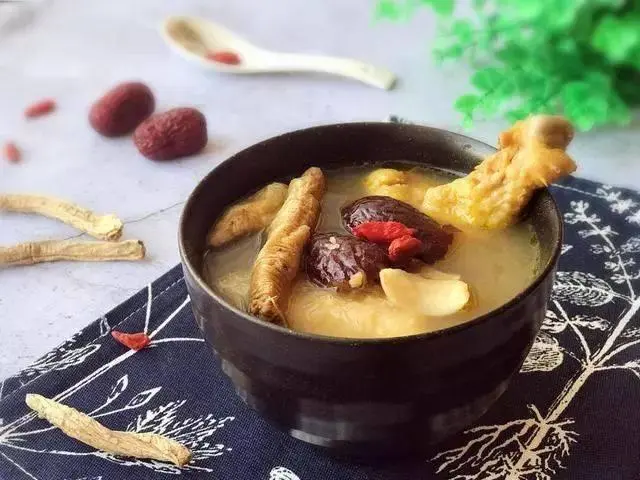
Yiqi Guo Xue Soup
[Ingredients] 250g of pork spine, 20g of Dang Shen, 3 red dates, 8 longan flesh (reduce if you dislike sweetness), 20 goji berries, 40 fox nuts, salt to taste. Cut the pork spine into large pieces and wash them, blanch in boiling water until blood is released, then rinse with cold water. In a pot, add the cleaned Dang Shen and fox nuts, along with the red dates and longan flesh, and pour in 1500ml of clean water. Cover and bring to a boil over high heat, then reduce to low heat and simmer until 750ml remains. Add the goji berries and simmer for another 10 minutes, finally seasoning with salt to taste.
[Effects] Tonifies the middle, benefits qi, strengthens the spleen, and nourishes the lungs. Used for symptoms of qi deficiency and lung weakness leading to shortness of breath, palpitations, poor appetite, loose stools, cough, and internal heat with thirst.
Images and some text sourced from the internet (please delete if infringing)


If you like this article, please give me a thumbs up!

